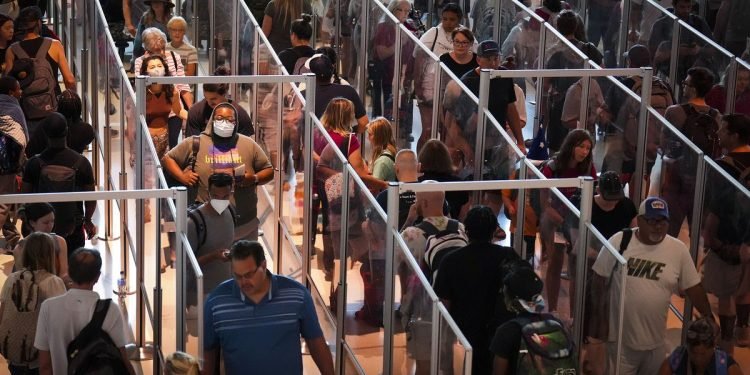Congress Assumes Control Over Various Aspects of Air Travel, Including Compensation for Late Flyers and Pilot Age
Congress to Vote on Legislation Affecting Aviation System Amid Summer Travel Frenzy

As the summer travel season reaches its peak and the aviation system faces challenges in keeping up, Congress is gearing up for a crucial vote on legislation that will shape the agency responsible for managing the nation's airspace safety and airline regulations over the next five years.
Lawmakers will be deliberating on various Federal Aviation Administration (FAA) rules, ranging from pilot training requirements and duty hours to compensation for travelers affected by flight cancellations and delays.
The White House has voiced its support for maintaining an Obama-era requirement that advertised airfares include mandatory taxes and fees, along with additional consumer protections proposed by President Joe Biden.
The deadline for Congress to act on the legislation is September 30. The House of Representatives plans to vote on a bipartisan bill this week, while the Senate has its own version, which involves over $100 billion in spending. However, disagreements over pilot training have delayed the Senate's committee vote.
Certain provisions in the legislation hold significant implications for airline consumers. One such provision aims to overturn a 2011 Department of Transportation regulation that mandates airlines to display the total price of a ticket in advertisements. Instead, airlines may only provide a link to the full price.
Consumer advocates oppose this rollback and, in alignment with the White House, argue that transparent advertising is crucial for helping consumers compare ticket prices effectively. Airlines, on the other hand, argue that most other businesses do not include taxes and fees in their initial prices.
The White House has also called for Congress to mandate airlines to compensate passengers for cancellations or delays caused by the airline's control. While some airlines already offer hotel and meal vouchers in such cases, the Department of Transportation seeks to go further by proposing cash compensation regulations, which might face legal challenges and take years to implement.
Consumer groups hope the Senate bill will incorporate more of their desired provisions, as they believe the House bill falls short in addressing longstanding consumer concerns with the airline industry. While there is broad support in the House bill for funding FAA initiatives, such as hiring more air traffic controllers, enhancing technology, and integrating drones and air taxis, some issues remain contentious. Notably, the change in pilot training standards, which would count more simulator time towards the required flight hours for an airline pilot's license, has divided opinions.
Smaller airlines advocate for this change, claiming it will alleviate the pilot shortage impacting service to smaller communities, while opponents argue it could compromise safety. The House bill also seeks to raise the mandatory retirement age for airline pilots from 65 to 67, which has sparked debate between airlines and pilot unions.
In addition to these issues, Delta Air Lines and Southwest Airlines are urging Congress to increase long-haul flight capacity to Washington Reagan National Airport, hoping to extend service to major cities on the West Coast and in the Rockies.
As the legislation faces deliberation, Congress must strike a balance between enhancing air travel and ensuring passenger safety and consumer protection in the aviation industry.

 chandni
chandni 



